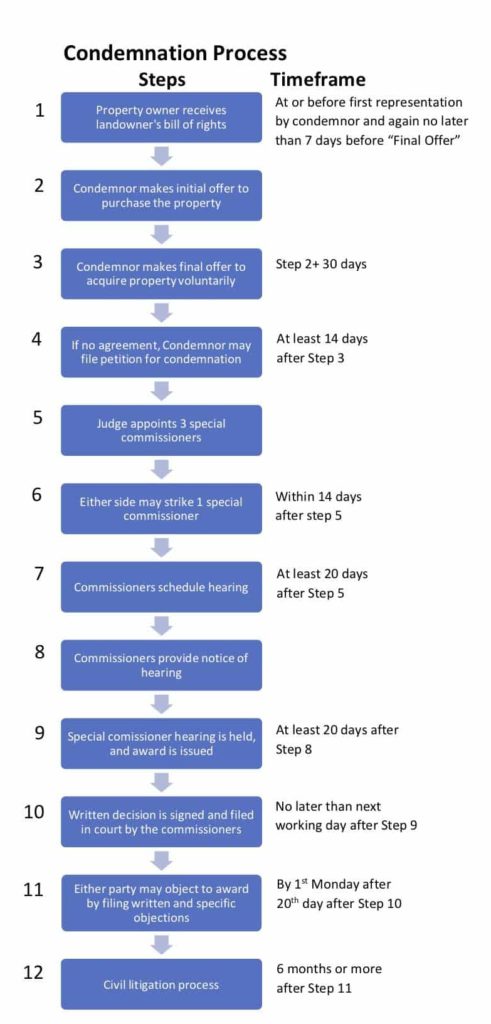In this Red Oak Pipeline Project Update video, Attorney Philip Hundl describes the latest route information for the pipeline, and he talks about landowners granting access to survey crews. Should you negotiate a temporary access agreement with the pipeline company or should you refuse access? What happens if the pipeline company seeks a temporary injunction for survey access to your property? Call 800-266-4870 for an appointment with Attorney Philip Hundl.
Summary of the Red Oak Pipeline Project and Temporary Injunctions Video
– Hi, my name’s Philip Hundl, I’m an attorney with Land Rights Law. My practice area focuses on representing landowners in condemnation matters. A condemnation matter could involve a pipeline, it could involve a high voltage power line, it could involve a water line, or it could involve a canal to transport water for various purposes. One canal example that comes to mind are condemnation cases by LCRA, the Lower Colorado River Authority.
Route Information for the Red Oak Pipeline Project

Today I’d like to talk again about the Red Oak Pipeline project. Plains America has this large pipeline that covers 29 counties of Texas. There’s a portion of the Red Oak pipeline that runs from Oklahoma down to just above Brenham and then splits off and goes to Beaumont and Corpus Christi. Then there’s a “fork in the road” just north of Brenham — the west side goes to Corpus Christi and the east side goes to Beaumont.
There’s also a portion of the pipeline from Midland, and it connects just south of Wichita Falls. But the primary part of the project that I’m going to talk about today is the portion that comes out of Oklahoma at Wichita Falls and then runs on the west side of Fort Worth, comes down near the town west of Cleburne, then it runs east of Waco, then runs along the Brazos River. It stays east of the Brazos River and then it cuts over to the west side of the Brazos River right around the Bryan, College Station area.
Then above Brenham, in Washington County, it forks off and it goes in two different directions. It goes into Grimes County, Montgomery County, a little part of Harris County, Liberty County, Jefferson County, and then Beaumont. The other part, the western leg, cuts across Washington County and goes through Fayette County near La Grange. It goes just north of La Grange and then it runs through Gonzales County.
It almost runs almost into Lavaca County — right on the border between Lavaca and Gonzales County. Then the pipeline runs through DeWitt County, Goliad County, and Bee County. The pipeline continues into San Patricio County, and then Nueces County down to Corpus Christi.
Access to Your Property

If you’re a landowner in the path of the Red Oak Pipeline project, most likely you’ve already been contacted by a right-of-way agent asking for access on your property. We’ve talked about how important it is to know what step of the condemnation process you’re in. There have been landowners who have already received their initial offers.
I’ve got a Condemnation Process chart that I always like to refer landowners to. Most folks affected by the Red Oak Pipeline project are in the step between one and two right now. Some landowners have not received initial offers, others have received initial offers, without actually a final survey being done.
So just be aware that if you’re a landowner and been asked for access to your property, the right-of-way agents have a proposed access agreement. They have a proposed easement agreement too that they’ll always present to you from the very beginning.
Please remember that the right-of-way agent works for the pipeline company and represents the pipeline company’s interests.
What Happens if You Refuse Access to Your Land?
Regarding access to your property, you can go a couple of different routes. Recently I’ve had some landowners calling me because they’ve been served with temporary restraining orders and notices of temporary injunction hearings. That’s because they hadn’t reached an agreement on temporary access. If the pipeline company is eager to conduct its surveys, then a lot of times the right-of-way agents won’t ask very many times for temporary access.
The pipeline company will just proceed with filing a lawsuit to get temporary access for the purpose of surveying. So if you receive personal service, you’ll be served by a constable or a private process server with a temporary restraining order, with a lawsuit, and a notice of a hearing.
Read more about temporary restraining orders and temporary injunctions by clicking this link.
Take it very seriously. Contact a lawyer who handles condemnation matters for landowners because the lawyer will know how to navigate the civil procedure of attending a hearing, the proper responses to file, and possible objections to make.
One of the possible objections is that you didn’t get enough notice of the temporary injunction hearing. Pursuant to the rules, you should receive at least three days notice of the temporary injunction hearing. The temporary restraining order only lasts for 14 days. There’s a requirement of a bond to be posted for the temporary restraining order.
There are lots of procedural steps the pipeline company must take that a lawyer would need to review. Your lawyer will check to see if everything’s been complied with by the pipeline company. Were you giving the required notice of the temporary injunction hearing? Did the hearing get reset because there wasn’t enough notice given to you, the landowner?
As a practical matter, probably the most practical strategy is to have a dialogue — either your lawyer with the right-of-way agent or you with the right-of-way agent — about a temporary access agreement. The negotiated temporary access agreement would allow the pipeline company to access your property. However the agreement would also limit what they’re going to do on your property and limit the time and days when they can come on your property.
The temporary access agreement should not allow the pipeline company to begin construction. I’ve seen a few “temporary access agreements” proposed by pipeline companies that actually gave the pipeline company the right to start construction. So you need to make sure that that temporary access agreement is only for the limited purposes of allowing the Red Oak Pipeline project to do what they need to do, while not damaging your property, and not beginning construction. Negotiating a temporary access agreement will avoid the pipeline company filing suit to get access through a temporary injunction.
The Downsides to the Landowner of a Temporary Injunction Hearing
The downside of going to a temporary injunction hearing related to access is that many Texas statutes provide the right for a common carrier to enter a landowners property for the purposes of surveying. If the pipeline company meets those requirements, then the company would have the right to enter your property.
Another downside to going to court is that the pipeline company will normally ask the court to award the pipeline’s attorneys fees paid by the landowner. Those attorney’s fees could be a pretty large amount of money because they will include payment for the time spent by the pipeline’s lawyers in drafting the petition, submitting the temporary restraining order to the judge, having the ex parte temporary restraining order hearing with the judge, and then preparing for and attending the temporary injunction hearing.
So the pipeline company’s attorney’s fees could become a large sum of money, and the landowner would not want to be assessed those attorneys fees by the court.
Hopefully this discussion has been helpful. These topics are relevant to the current stage of the Red Oak Pipeline project. Should you grant the pipeline company access to your property or do you not grant access, and if so, how? I strongly recommend you seek legal counsel on to make sure that from the very beginning you’re starting the process correctly with the right temporary access agreement. Hopefully that’s helpful, thank you very much.
Let Us Help You Through the Condemnation Process
You have rights in condemnation and eminent domain. You should talk with a lawyer who is experienced in representing landowners in condemnation to ensure that you understand your rights. Call 800-266-4870 for an appointment with Attorney Philip Hundl. You can also click this link to request a no-obligation case evaluation.
Call 800-266-4870 or text 979-320-9320 for an appointment. We can also arrange for online and telephone appointments all over Texas.